Arfurla Picosecond Nd Yag Laser Tattoo Removal Pigment Removal
Arfurla Picosecond Laser is a cutting-edge, non-invasive picosecond laser system designed to deliver unparalleled results in skin revitalization, pigmentation correction, tattoo removal, and acne scar treatment. Superior efficacy with minimal downtime. Engineered for precision and safety, this system is ideal for clinicians seeking advanced solutions for diverse skin concerns.
Laser instantly emits high energy, effectively crush and removes the pigment in the diseased tissue. The pigment rapidly explodes and cracks when heated rapidly. The superficial epidermis immediately pops out of the body. The deep pigmentation of the basement tissue breaks into fine granular metabolism. It gradually fades until it disappears. The laser energy is strongly absorbed by melanin and hemoglobin, while the surrounding normal skin tissue does not form any damage because it does not absorb laser light of a fixed wavelength.
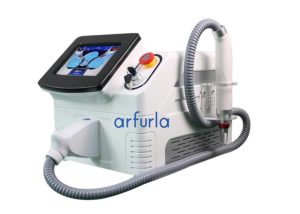
Advanced Pigment & Tattoo Removal Picosecond Laser
1.Picosecond Photoacoustic Effect
Shatters ink particles and melanin into ultrafine fragments, enabling faster clearance
No Thermal Damage: Minimizes erythema and hyperpigmentation risks, even for stubborn colors (e.g., blues, greens).
2.Acne Scar & Wrinkle Reduction
Laser-Induced Optical Breakdown (LIOB): Stimulates collagen and elastin via controlled subdermal micro-injuries, improving skin texture and elasticity.
3.Non-Invasive Skin Rejuvenation
Low-energy, high-frequency pulses brighten skin tone and reduce pore size with zero downtime.
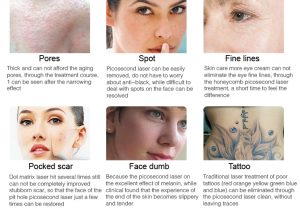
755nm wavelength: Precisely targeting melanin and dark tattoos
Efficacy and mechanism:
Melanin preferential absorption: 755nm wavelength has a very high absorption rate for melanin, especially for melanin particles from the epidermis to the shallow dermis (such as freckles, solar sunspots, and nevus of Ota).
Picosecond photoacoustic effect: Photoacoustic shock waves are generated through picosecond ultra-short pulses (non-Q switching technology), which instantly crush melanin or dark tattoo ink (such as black, blue) into micron-sized particles, which are metabolized by the lymphatic system, significantly reducing the number of treatments
Safety: Due to the extremely short pulse, the surrounding tissue damage caused by the photothermal effect is avoided, and the risk of anti-melanin (PIH) is reduced.
Clinical Applications :
Dark tattoos (black, blue, green) removal
Pigmented lesions (freckles, age spots, nevus of Ota)
Brightening skin tone (adjuvant treatment for Asian melasma)

1064nm wavelength: deep penetration and comprehensive repair
Efficacy and mechanism:
Deep targeting: The 1064nm wavelength can penetrate the deep dermis to the subcutaneous tissue, suitable for treating deep pigments (such as malar brown-blue nevus) and vascular lesions (such as hemangiomas and spider nevi).
Collagen stimulation: Through laser-induced optical breakdown (LIOB), a controllable microcavitation effect is produced in the dermis, activating fibroblasts, promoting collagen and elastin regeneration, and improving acne scars, stretch marks and skin sagging.
Even skin tone: In low-energy mode, melanin can be evenly decomposed to achieve “Skin Rejuvenation” and brighten dull skin tone.
Clinical application:
Deep pigmented lesions (brown-blue nevus, chloasma)
Acne scars, stretch marks repair
Skin tightening and pore reduction
Vascular lesions (red blood streaks, rosacea)
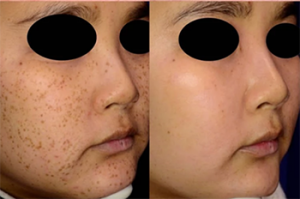
532nm wavelength: the nemesis of superficial pigments and vascular lesions
Efficacy and mechanism:
Precise superficial effect: 532nm is efficiently absorbed by oxygenated hemoglobin and superficial melanin, suitable for red or light brown lesions in the epidermis.
Highly effective red removal: Targeting hemoglobin in blood vessels, the photoacoustic effect blocks abnormal capillaries (such as facial flushing, port wine stains), while decomposing superficial spots (such as coffee spots, sunburn).
Low thermal damage: Picosecond pulses avoid the continuous heat accumulation of traditional lasers and reduce the risk of purpura (common after nanosecond laser treatment of blood vessels).
Clinical applications:
Superficial pigmentation (coffee spots, solar keratosis)
Vascular lesions (spider nevus, port wine stains)
Sensitive skin rejuvenation (gentle brightening in low energy mode)
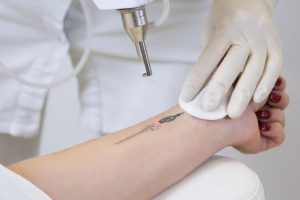
1320nm wavelength: non-ablative deep reconstruction
Efficacy and mechanism:
Water molecule targeting: 1320nm wavelength is moderately absorbed by the water in the dermis, producing a controllable thermal effect, stimulating collagen remodeling without damaging the epidermis (non-ablative dot matrix mode).
Dermal reconstruction: Through picosecond dot matrix technology, a “micro-treatment zone” (MTZ) is formed in the dermis, initiating a wound healing response, promoting continuous collagen proliferation, and improving deep wrinkles, atrophic scars and skin elasticity.
Low downtime: Because there is no epidermal exfoliation, the recovery period only takes 24-48 hours (traditional CO2 dot matrix takes 1-2 weeks).
Clinical applications:
Deep wrinkles (nasolabial folds, neck wrinkles)
Atrophic acne scars, surgical scars
Repair of skin sagging and photoaging
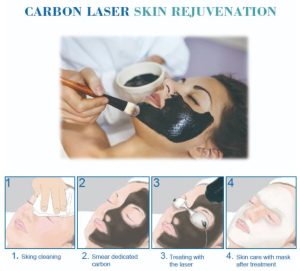
Arfurla Picosecond Nd Yag Laser Tattoo Removal Pigment Removal
Arfurla Picosecond Laser is a cutting-edge, non-invasive picosecond laser system designed to deliver unparalleled results in skin revitalization, pigmentation correction, tattoo removal, and acne scar treatment. Superior efficacy with minimal downtime. Engineered for precision and safety, this system is ideal for clinicians seeking advanced solutions for diverse skin concerns.
Laser instantly emits high energy, effectively crush and removes the pigment in the diseased tissue. The pigment rapidly explodes and cracks when heated rapidly. The superficial epidermis immediately pops out of the body. The deep pigmentation of the basement tissue breaks into fine granular metabolism. It gradually fades until it disappears. The laser energy is strongly absorbed by melanin and hemoglobin, while the surrounding normal skin tissue does not form any damage because it does not absorb laser light of a fixed wavelength.

Advanced Pigment & Tattoo Removal Picosecond Laser
1.Picosecond Photoacoustic Effect
Shatters ink particles and melanin into ultrafine fragments, enabling faster clearance
No Thermal Damage: Minimizes erythema and hyperpigmentation risks, even for stubborn colors (e.g., blues, greens).
2.Acne Scar & Wrinkle Reduction
Laser-Induced Optical Breakdown (LIOB): Stimulates collagen and elastin via controlled subdermal micro-injuries, improving skin texture and elasticity.
3.Non-Invasive Skin Rejuvenation
Low-energy, high-frequency pulses brighten skin tone and reduce pore size with zero downtime.

755nm wavelength: Precisely targeting melanin and dark tattoos
Efficacy and mechanism:
Melanin preferential absorption: 755nm wavelength has a very high absorption rate for melanin, especially for melanin particles from the epidermis to the shallow dermis (such as freckles, solar sunspots, and nevus of Ota).
Picosecond photoacoustic effect: Photoacoustic shock waves are generated through picosecond ultra-short pulses (non-Q switching technology), which instantly crush melanin or dark tattoo ink (such as black, blue) into micron-sized particles, which are metabolized by the lymphatic system, significantly reducing the number of treatments
Safety: Due to the extremely short pulse, the surrounding tissue damage caused by the photothermal effect is avoided, and the risk of anti-melanin (PIH) is reduced.
Clinical Applications :
Dark tattoos (black, blue, green) removal
Pigmented lesions (freckles, age spots, nevus of Ota)
Brightening skin tone (adjuvant treatment for Asian melasma)

1064nm wavelength: deep penetration and comprehensive repair
Efficacy and mechanism:
Deep targeting: The 1064nm wavelength can penetrate the deep dermis to the subcutaneous tissue, suitable for treating deep pigments (such as malar brown-blue nevus) and vascular lesions (such as hemangiomas and spider nevi).
Collagen stimulation: Through laser-induced optical breakdown (LIOB), a controllable microcavitation effect is produced in the dermis, activating fibroblasts, promoting collagen and elastin regeneration, and improving acne scars, stretch marks and skin sagging.
Even skin tone: In low-energy mode, melanin can be evenly decomposed to achieve “Skin Rejuvenation” and brighten dull skin tone.
Clinical application:
Deep pigmented lesions (brown-blue nevus, chloasma)
Acne scars, stretch marks repair
Skin tightening and pore reduction
Vascular lesions (red blood streaks, rosacea)

532nm wavelength: the nemesis of superficial pigments and vascular lesions
Efficacy and mechanism:
Precise superficial effect: 532nm is efficiently absorbed by oxygenated hemoglobin and superficial melanin, suitable for red or light brown lesions in the epidermis.
Highly effective red removal: Targeting hemoglobin in blood vessels, the photoacoustic effect blocks abnormal capillaries (such as facial flushing, port wine stains), while decomposing superficial spots (such as coffee spots, sunburn).
Low thermal damage: Picosecond pulses avoid the continuous heat accumulation of traditional lasers and reduce the risk of purpura (common after nanosecond laser treatment of blood vessels).
Clinical applications:
Superficial pigmentation (coffee spots, solar keratosis)
Vascular lesions (spider nevus, port wine stains)
Sensitive skin rejuvenation (gentle brightening in low energy mode)

1320nm wavelength: non-ablative deep reconstruction
Efficacy and mechanism:
Water molecule targeting: 1320nm wavelength is moderately absorbed by the water in the dermis, producing a controllable thermal effect, stimulating collagen remodeling without damaging the epidermis (non-ablative dot matrix mode).
Dermal reconstruction: Through picosecond dot matrix technology, a “micro-treatment zone” (MTZ) is formed in the dermis, initiating a wound healing response, promoting continuous collagen proliferation, and improving deep wrinkles, atrophic scars and skin elasticity.
Low downtime: Because there is no epidermal exfoliation, the recovery period only takes 24-48 hours (traditional CO2 dot matrix takes 1-2 weeks).
Clinical applications:
Deep wrinkles (nasolabial folds, neck wrinkles)
Atrophic acne scars, surgical scars
Repair of skin sagging and photoaging
